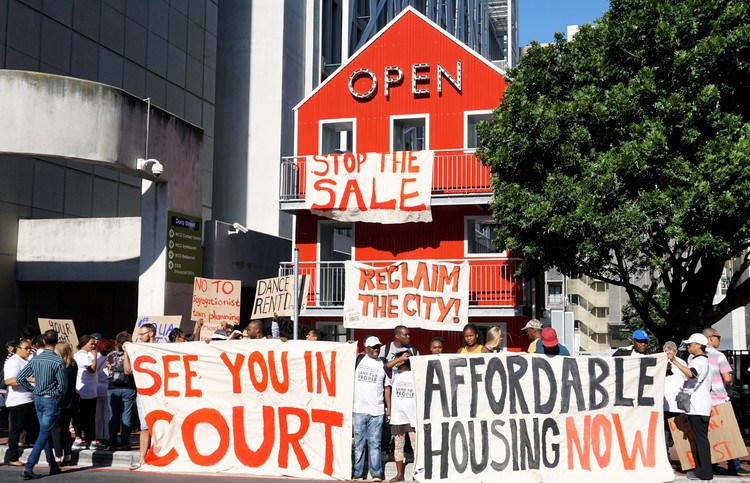Activists go to court to overturn Tafelberg sale
Campaigners want Sea Point property to be used for affordable housing
Activists want the Western Cape High Court to declare that the province and City have failed to address the “spatial apartheid” that persists in central Cape Town and that this violates its obligations under the Constitution. They also want the decision to sell the Tafelberg property in Sea Point to be reviewed and set aside.
The application was filed by Ndifuna Ukwazi Law Centre on behalf of its trustees, Reclaim the City as well as a few Cape Town residents. It was brought against among others, four national ministers, the Premier of the Western Cape and the City of Cape Town in the Western Cape High Court. The first respondent is the provincial MEC for Transport and Public Works (Donald Grant).
The applicants want the court to compel the province and City to comply with their obligations to redress spatial apartheid and report to the court to ensure that they do so.
They also want the designation of Tafelberg property as “surplus” to be set aside, saying that if “the property was not surplus, then its subsequent sale to the school was unlawful and would also have to be set aside.”
Furthermore, they are calling for the provincial Cabinet’s decision to continue with the sale of Tafelberg to be set aside.
“The longer the province and the City defer giving effect to their obligations with regard to redressing spatial apartheid in central Cape Town, the more difficult it will become to comply with them, and the less likely it will be that their programmes will have any meaningful impact,” states Sea Point resident Thozama Adonisi in her founding affidavit. Adonisi is one of the applicants in the case.
Adonisi says that the Constitution, together with legislation, “makes it imperative for the province and the City to redress the legacy of spatial apartheid”.
She states that both the City and the province “have failed to comply with their constitutional and statutory obligations to redress the effects of spatial apartheid in central Cape Town”.
The decision to declare the Tafelberg surplus came despite the fact that the Head of the Department of Human Settlements (DHS), along with the National Association of Social Housing Organisations and the Social Housing Regulatory Authority recommended that Tafelberg be used for a social housing programme. A letter sent from the head of the DHS formally objected to the sale of the property and highlighted the importance of using this particular property.
The letter stated: “Cape Town is one of the most segregated cities in the world. With this in mind, land cost is so significant in the province that we could not afford to purchase market-related land which offered even slightly similar opportunities to this one. Were these portions of land to be disposed of, the opportunity cost for integration within the borders of the City could potentially be lost to us forever.”
Adonisi also said that the City themselves, “took part in negotiations for the department to reserve the Tafelberg and Woodstock Hospital sites to be transferred to the City, at no cost, and for the City then to propose the sites to its social housing partners”.
The applicants, in April 2016, requested reasons from the province for why Tafelberg was being sold. The court papers state that despite an undertaking to provide these reasons, they were never given.
In May 2016, Reclaim the City and Ndifuna Ukwazi obtained an interim interdict that halted the sale of Tafelberg and a new public participation process began.
But in March 2017, the Cabinet decided to confirm the property’s categorisation as “surplus” and to continue with the sale. The Cabinet placed importance on the fact that the Tafelberg property got an offer of R135 million, revenue that will be used to fund new offices for the provincial Department of Education.
However, the application goes beyond the sale and argues that the government’s failure to address “spatial apartheid” that persists in Cape Town violates its obligations under the Constitution.
The applicants are relying on sections 25 and 26 of the Constitution to make their argument. Section 26 is the right to housing and has been litigated and developed before this. Section 25 (5), which hasn’t been considered as much, provides that the state must take reasonable measures to “‘create conditions that enable citizens to gain access to land on an equitable basis”. There are many precedents, which set out the obligations of the state in relation to addressing land inequities resulting from apartheid. However, the applicants in this case hope to highlight their view that government policies have continued to cement the legacy of apartheid.
If Reclaim the City is successful, this case has the potential to provide disadvantaged communities with a powerful precedent to address land inequality. But even if Reclaim the City is unsuccessful, this case is an important one that will clarify what obligations provincial governments have to address the geographical inequalities inherited from apartheid.
Support independent journalism
Donate using Payfast

Don't miss out on the latest news
We respect your privacy, and promise we won't spam you.
Next: Eldorado Park explodes over lack of houses and jobs
Previous: Masiphumelele residents show Public Protector how they live
© 2017 GroundUp. 
This article is licensed under a Creative Commons Attribution-NoDerivatives 4.0 International License.
You may republish this article, so long as you credit the authors and GroundUp, and do not change the text. Please include a link back to the original article.

